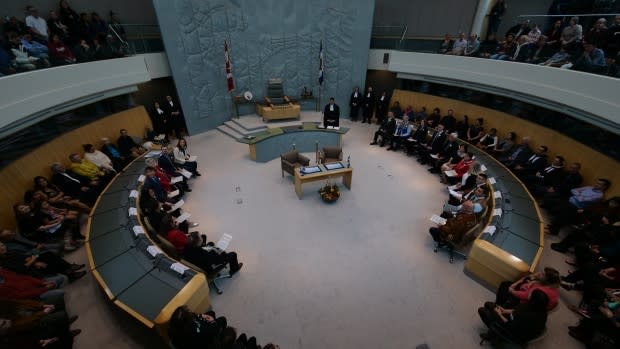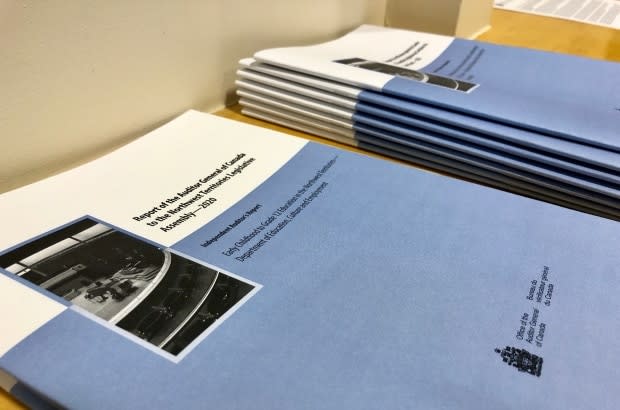'We are not in a crisis': New N.W.T. government delivers $1.9B budget
The Northwest Territories government proposes to spend $1.9 billion on operational costs in the next fiscal year, but little new funding has been allocated in key areas said to be in crisis by several residents, advocates and front-line government workers.
The proposed budget includes no major spending increases in the Child and Family Services division or Education, and a decrease in spending on the NWT Housing Corporation.
Ahead of her budget speech, Finance Minister Caroline Wawzonek told reporters the money that is being spent in these areas are amounts that departments need in order run existing programs. It's "not reflective, necessarily" of the government's 22 new mandate priorities, she said.
According to this budget, the government plans to spend $25 million on its mandate goals over the next three and a half years of this Legislative Assembly, $10 million of which it proposes spending in the upcoming fiscal year.
"Anyone in government is going to sit here and say we'd always like to have more money," said Wawzonek, adding that it's what government does with the money it has that matters.
No new taxes
"The Northwest Territories economy is stable, but it is not growing," Wawzonek said in her budget speech on Tuesday afternoon.
With that in mind, the government is proposing to spend $1.983 billion on operational costs in the 2020-21 fiscal year, up from the $1.87 billion it pitched to spend in the year prior. Meanwhile, it's projecting to make about $2.186 billion in revenues.
Though the government expects to bring in about $203 million more than it will spend on delivering programs and services in the next fiscal year, this doesn't mean it's sitting on a pile of extra cash.
Our immediate fiscal situation is not what was hoped in the last budget but it is manageable. - Caroline Wawzonek, N.W.T. finance minister
That operating surplus will be put toward the $398.6-million capital budget, which has already been approved by the assembly.
This leaves the government with a cash deficit of $195.6 million — money it will have to borrow, pushing the territory closer to its federally-imposed borrowing limit.
The government estimates its borrowing will reach nearly $1.2 billion in 2020-21. The debt cap is set at $1.3 billion.
Finance officials said on Tuesday that the government is in talks with the federal government about raising the borrowing limit, which last went up in 2015.
"Our immediate fiscal situation is not what was hoped in the last budget but it is manageable," Wawzonek told the legislative assembly.
"We are not in a crisis."
There are no new taxes in the 2020-21 budget, but finance officials said property tax mill rates in the smaller communities that don't collect their own property taxes, and in "the hinterland" which includes the diamond mines, as well as some fees, will rise with inflation on April 1.
Less revenues from mining, cannabis
The vast majority of the government's revenues — 82 per cent — is expected to come from the federal government. This includes a $1.4-billion territorial formula financing payment, which is meant to help the territorial government administer programs and services comparable to those in the provinces.
As was always the plan, the carbon tax will rise to $30 per carbon-equivalent tonne of greenhouse gas emissions on July 1, with plans to return a majority of that money through rebates to residents and businesses.

Notably, the government raised just $317,000 from the cannabis excise tax in 2019-20, less than half of what it initially projected. This coming year, it expects to bring in $331,000 from cannabis sales.
The government also estimates it will get about $33 million in royalties and fees from mining and oil and gas operations. This is down about $6 million from 2019-20 estimates.
Finance officials said the decrease is due in part to market conditions, and to discrepancies in forecasting by the companies themselves.
Key ailing areas
Those looking for major changes in the areas of education, child and family services or housing, won't find them in this budget.
Despite public and internal outcry over a Child and Family Services division in which staff say they are overworked and under-resourced, the government proposes increasing the division's budget by just $280,000 from the year before.
Earlier this month, the Department of Education, Culture and Employment was subject to a critical review of the Auditor General of Canada, in which it was called out for not providing all students in the territory equal access to quality education.
It's unclear whether any changes were made to this budget as a result, but the budget does propose $604,000 to bring the Northern Distance Learning program — in which students take courses that aren't offered in their own schools via video conferencing — to five more schools.
There is also $129,000 to expand "northern studies curricula."

To the NWT Housing Corporation, the government is planning to contribute about $2 million less than it did in the previous fiscal year. The corporation does plan to spend $2.2 million more on minor renovations to its housing stock.
While education officials and others have lamented the slow pace of change in government, Wawzonek said she takes a different view.
"Sometimes I think acting too quickly is the reaction of government," she told reporters.
"The approach that we want to take is to actually stand up and take the criticism of not acting fast enough and instead take the time to make sure that we're using our money the best possible way."
Other highlights
After a near-strike and renewed collective bargaining, the government will spend $39 million more on wages for unionized employees.
$3.9 million for 72 long-term care beds in Yellowknife, which will be set up in the old Stanton Territorial Hospital building.
$1.9 million for air tanker fleet operations to fight wildfires.
$2.5 million for running the new Stanton Territorial Hospital, which includes money for orderlies, behavioural health workers, lab services and more.
$268,000 to promote N.W.T. as a tourist destination.
$1.6 million to support the RCMP.


